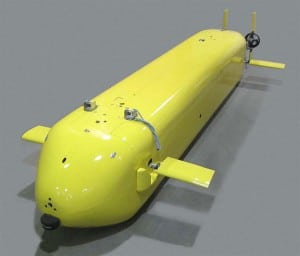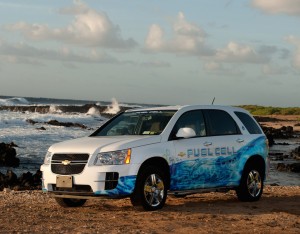
Technology some see as the key to the future for the auto industry could also play a significant role for the U.S. military.
General Motors is teaming up with the U.S. Navy in the effort to develop a new generation of unmanned undersea vehicles that would rely on hydrogen fuel-cell technology to operate independently for as long as 70 days at a time. The technology would replace the more limited battery-drive systems currently in use in so-called UUVs, according to Navy officials.

“If you want long endurance you really need fuel cells,” said Karen Swider-Lyons, head of the Alternative Energy Section at the Naval Research Laboratory.
UUVs have been in use for a number of years and have traditional been about the size of a submarine’s torpedo. But the goal is to make them larger, add more features and functions and let them operate independently for longer periods of time. Battery technology simply won’t work.
(Novel Nissan approach could solve problem of hydrogen availability. Click Here for the story.)
Fuel-cell technology has also been around for a number of years. In fact, the basic concept was developed in the 1850s, though it wasn’t put to practical application until the Apollo mission, providing power for spaceships heading to the moon. More recently, automakers have been investing billions of dollars in an effort to put hydrogen power on the road.

There are currently three manufacturers offering fuel-cell vehicles to the retail market, Hyundai, Toyota and, most recently, Honda. General Motors has a number of prototypes in fleet testing and is expected to join that list before the end of the decade.
And the advantages the technology offers clearly isn’t limited to automobiles, said Charles Freese, the executive director of GM’s fuel-cell program. “There are a number of non-automotive customers who can benefit from fuel-cell technology,” Freese said during a joint conference call with the Navy officials.
One of the advantages is that fuel-cell “stacks” can be scaled up or down in size to fit into different sized vehicles, whether they operate on the road or under the water. A stack is a device that combines hydrogen gas with oxygen from the atmosphere. It creates a stream of current that can operate an electric motor driving an automobile’s wheels, or an underwater vehicle’s propeller.
“Our in-water experiments with an integrated prototype show that fuel cells can be game changers for autonomous underwater systems,” said Frank Herr, department head for the Navy’s Ocean Battlespace Sensing research unit in a statement.
(Mercedes-Benz set to join ranks of makers offering fuel-cell vehicles. Click Here for the latest.)
Fuel-cells are far more energy dense than batteries. They have been shown to be durable and flexible and can provide power for both an underwater propulsion system and the electronic systems crammed into a UUV. A hydrogen tank, meanwhile, can be refilled in a matter of minutes, far faster than even the most advanced batteries can be recharged. And that’s another significant plus, according to Richard T. Carlin, the Navy research labs head of sea warfare and weapons development.
Under ideal circumstances, the Navy is hoping its next-generation UUVs will be able to operate underwater for as long as 70 days, said Swider-Lyons. The precise length of a run will depend, however, upon what the vehicle is actually required to do.
As for timing, the program is already in the process of moving from concept to prototype. But it’s unclear when the first of the hydrogen-powered UUVs will be ready to ply the seas. The fuel-cell technology is actually read to go, Swider-Lyons said. Developing the necessary autonomous control systems is the more serious technical challenge.
(All new German cars will need be emissions-free by 2030, says government official. Click Here for the story.)







